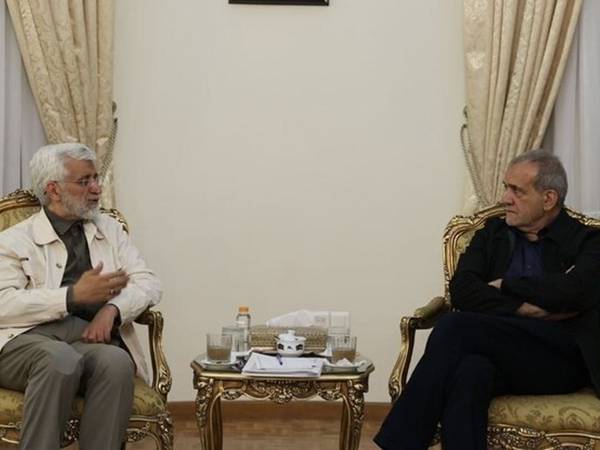Iran’s defeated presidential candidate Saeed Jalili visited president-elect Masoud Pezeshkian’s office on Saturday night, less than one day after the election results were announced, where the two held a meeting.
Media in Tehran reported that in this “cordial meeting,” Jalili once again congratulated Pezeshkian on his election and outlined his views on the most important issues facing the country and the solutions to address them.
Jalili who was the candidate of so-called “revolutionary forces” insisted during the election campaign that he was the only candidate with comprehensive plans for the country. His ideas centered on Iran’s self-reliance and trade with friendly countries such as Russia.
President-Elect Pezeshkian reportedly told Jalili, “Having a plan is not the only condition for success; employing knowledgeable, skilled, and dedicated individuals is essential to ensure the effective implementation of those plans. “
Pezeshkian’s predecessor, Ebrahim Raisi, often faced criticism for appointing officials based on ideological credentials, favoring "revolutionary forces," particularly members and supporters of the ultra-hardliner Paydari party. In contrast, Pezeshkian has pledged to prioritize meritocracy, emphasizing the qualifications and dedication of candidates for top government positions.
However, a lot depends on Supreme Leader Ali Khamenei in case of ministers and directors of numerous government agencies in Iran’s sprawling bureaucracy. Khamenei or his office have the final say in military, intelligence, ideological and many economic appointments. Pezeshkian also faces a potentially hostile parliament where hardline politicians hold sway, who will closely scrutinize high-level appointments.
Jalili and his hardline political block were able to fill the Raisi administration with ministers and top managers. He often appeared sharing advice with the president and backed him despite his administration’s obvious failure to improve the battered economy.
Media in Tehran reported that Pezeshkian agreed to receive Jalili’s proposals and ideas, but that could have been more of a show of political courtesy than a genuine desire. Jalili’s isolationist ideas seems contrary to Pezeshkian’s pledges about improving Iran’s international relations and trying to reduce sanctions.
“A few hours ago, I had a meeting with Dr. Pezeshkian, and I told him that we consider it our duty to assist in the path of the revolution, the direction of the country, and the three branches of government, including the newly elected president,” Jalili was quoted as saying.
The key phrase here is “the direction of the country” for Jalili, who is steadfast in opposing the West and supporting Khamenei’s foreign policy tenet of relying on Russia and China instead of resolving the nuclear and other issues with the United States and its European and regional allies.
Some speculate that Khamenei allowed Pezeshkian’s candidacy and victory because he has decided to iron out problems with the West, ahead of a possible Donald Trump victory in the US presidential race in November. Others say that he simply wanted new faces representing the Iranian government in order “to buy time” and breathing space considering possible Trump pressures. Whatever the case, Jalili, who has been deeply involved in the Islamic Republic’s national security apparatus for nearly two decades, is here to stay. He may potentially serve as the Supreme Leader’s lever of pressure in both domestic and foreign policy.
